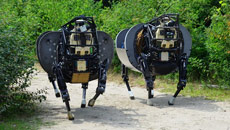VANCOUVER — A group of 20-somethings flew from Vancouver to El Salvador earlier this month to build new homes for agricultural families displaced by flooding. Their materials included wood, fibre cement and, most importantly, Snapchat.
The millennials used the popular video-messaging app to record heartfelt donation requests, and then fanned them out to their social networks. In short order, each had crowdfunded the $3,000 required per home for the 20 families.
The innovative fundraising method that leverages several technologies was developed by a Vancouver technology startup called Change Heroes.
It's just one of several ventures by British Columbia-based tech companies that are turning philanthropy on its head. They're doing it by tapping the hard-to-reach millennial demographic using the digital medium that dominates their lifestyle.
"It's thinking totally outside of the box," said Taylor Conroy, CEO of Change Heroes.
By using the tools young adults communicate with, in this case personal, one-to-one video messages, more than 50 per cent of those asked made donations. The average donation was $250.
"It's the highest converting fundraising platform on the planet, it's way higher than a person on a street, a black-tie dinner or golf tournament," Conroy said.
Charities are facing challenges these days raising donations from younger donors, and the void is especially apparent during the season of giving.
The cost associated with persuading people to give to charities has jumped over the past five years from $150 per donor to upwards of $800 each, Conroy said.
"Non-profits are in absolute crisis right now because of the shift from baby boomers to millennials," he said.
Millennials represent a vast potential donor base. The problem is that traditional charities don't know how to connect, say the experts.
It's not correct that millennials don't give, said John Bromley, who has spent a decade working with charities.
"(Millennials) are so web-fluent that they live online — and charities don't," said Bromley, CEO and founder of Chimp, a technology-driven public foundation that facilitates gifts to other charities.
Chimp gives users a free online bank account to specifically manage their charitable donations. It helps people give money to any registered charity in Canada, to pass money to a friend to give away, or, to organize groups who want to pool cash and give socially.
Many charities don't have sophisticated websites that attract the advanced web user, Bromley said. Millennials instead gravitate to crowdfunding platforms that specifically target them, like Indiegogo and Kickstarter.
But they don't realize that donating directly to a friend's cause is more altruism than charity, he said. They may encounter trouble in the unregulated system that lacks checks and balances — and will also miss out on tax receipts.
Rather than be stingy, Bromley predicts millennials are becoming even more generous than previous generations because their online capabilities mean they are hyper-aware of problems across the globe.
"Everyone in the world wants change and has something to give," he said.
Technology also allows non-profits to focus on their core competencies, rather than spend resources putting on elaborate events to extract donations, said Shafin Diamond Tejani, a director with the Vancouver branch of Social Venture Partners.
The costs of soliciting donors also plummets as non-profits transition to online campaigns and donor management systems — away from expensive mailouts, TV commercials and third-party sidewalk canvassers.
Tejani is also CEO of Fantasy 6, a firm with expertise in mobile gaming that's benevolently using online fantasy sports to fundraise using its foothold with 18 to 34 year olds.
"You might have a good message, but won't succeed without the ability to hit this new audience that has access to so many choices," Tejani said of the copious options for giving.
"It's really working with a charity to equip them to take advantage of all these things."
But can good acts be done by companies seeking profits?
Conroy with Change Heroes said the charity model is broken when good only counts if it comes from a non-profit that must squeeze every penny and avoid all risk.
He believes for-profit tech firms and non-profits can work together.
"Think Facebook, think Instagram, think of these companies that have been able to scale 100-times, 1000-times in one year because they're leveraging technology," he said.
"What we're doing is leveraging technology — but we're leveraging it for the benefit of humanity."





